Official launch of the Education Programme for Zambian learners
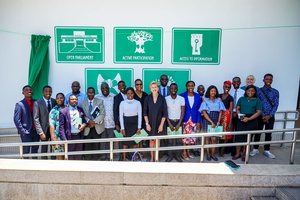
The official launch of the Educational Programme for Zambian Learners on 15 October 2019 in Lusaka was attended by a large number of pupils and teachers, members of parliament, representatives of various departments of the National Assembly of Zambia and both partner Parliaments. The Austrian Parliament was represented by the Vice-Clerk, Dr. Susanne Janistyn-Novák, who emphasized in her introductory words the importance and value of sound democratic education for young people, who, through their active role and participation, have a say in the future of a country.
Hon. Catherine Namugala, First Deputy Speaker of the National Assembly of Zambia, thanked the donors and cooperation partners for their collaboration in creating the Educational Programme, which addresses and engages different audiences through its diverse activities. The Educational Programme has been developed over the past two years in an intensive peer-to-peer exchange between the public relations departments of the Zambian and Austrian Parliament within the framework of the NorthSouthDialogue of Parliaments.
The Educational Programme for Zambian Learners aims to provide children and young people with a comprehensive understanding of the functions of a parliament, of democracy in general, the value of democratic institutions and the possibilities of active participation. The central components of the programme are the five aspects "Open Parliament", "Active Participation", "Spirit of Democracy", "Access to Information" and "Freedom of Expression". These were also graphically implemented and placed on the wall of the visitor center of the Zambian parliament.
The definition of a democracy education program for the National Assembly of Zambia
Public relations are one important focus of the cooperation between the Zambian and the Austrian Parliament within the framework of the NorthSouthDialogue of Parliaments. More precisely, the domocratic processes and the functions of a parliament shall be efficiently explained to the citizens.
Already during the preparatory meetings for this project in 2016, staff members of the NAZ were enthusiastic about the various PR activities of the Austrian Parliament, such as the open day, democracy workshop, discussion events, youth parliament, etc. Above all, the intensive work with children and youth was of great interest for the colleagues from Zambia.
Almost half of Zambia's 16.5 million inhabitants are below 15 years. Accordingly, the interest of the National Assembly to offer democratic education activities for this target group is great. It was therefore decided to develop a strategy for a "democracy education program for pupils". In it, specification on goals, target group and measures must be put down.
From the Austrian Parliament Mrs. Sari Krammer, who has worked for many years in the area of the democracy workshop and has the necessary expertise, was assigned to this project as a parliamentary resource person.
28th September to 5th October 2018 - Knowledge as key to participation
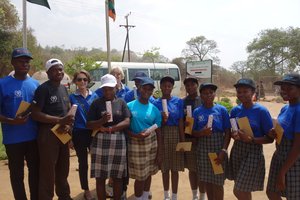
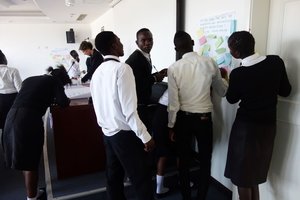
After working visits to Zambia in February 2018 and the visit of the Zambian delegation to Austria in June, the final working visit to the National Assembly of Zambia's Democracy Policy Education Program was held under the banner "Knowledge is the key for active participation in democracy ".
The focus of this work week was above all the exchange with the target group, namely Zambian learners. As part of a visit to the constituency of Ngoma and a workshop in the Parliament with students of a community school, their ideas and wishes regarding democracy policy activities and programs could be inquired and developed. These will be incorporated into the overall document.
In a further step, the workshop group met again, which already defined parts of the strategy of the education program in February, in order to continue to work on the contents of the educational program.
In a meeting with the Director of NAZ, Mrs. Cecilia Mbewe, as well as the head of public relations, Stephen Kawimbe, in whose area also the implementation of the democratic education program falls, Kashimbi Limata (NAZ), Sari Krammer (Austrian Parliament) and project coordinator Jutta Kepplinger presented the results. The parliamentary director was very pleased about the progress of the project as well as the content of the priorities.
In a final step, the document will be finished by the responsible persons in autumn. The beginning of implementation is scheduled for spring 2019.
Working visit to Vienna - democracy in motion
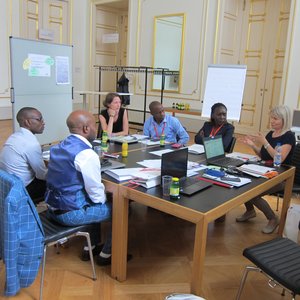
An important pillar of the partnership between the Austrian Parliament and the National Assembly of Zambia (NAZ) is the field of youth - political and democratic education. In February, in a 3-day workshop in Lusaka, the vision and objectives of a programme of democratic-political education for Zambian learners and youth were defined. In addition, a strengths-weaknesses/opportunities-risk analysis and a resource analysis were carried out.
During the working visit of employees of the NAZ in the first week of June in Vienna, further input was given and best practice was discussed. The different formats for promoting democracy to young people in the Austrian parliament were presented and analysed with regards to a possible implementation in Zambia. The work program included a visit to the democracy workshop, a joint tour of parliament with a school class, and participation in a "democracy in motion" workshop at a Vocational School in Vienna.
The educational programme could be extended through several ideas and topics. By September, a first concept will be presented, discussed and further developed in Lusaka at a second workshop in early October.
3rd to 10th of February 2018 - PR Workshop in Lusaka
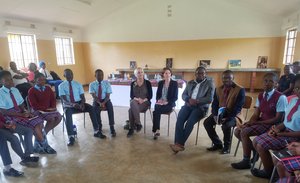
From the 3rd to the 10th of February 2018 Sari Krammer facilitated a Workshop together with project manager Jutta Kepplinger. In addition to the development of the strategy, a visit to a school and a constituency office - a so-called "field office of Parliament" - were on the agenda. This was important in order to get an idea of what activities could take place outside Parliament.
The 3-day workshop itself was held in the Parliament's Visitor Center and was jointly opened by PD Cecial Mbewe and First Vice-President Catherine Namugala, with great interest from parliamentary staff. However, not only staff members of Parliament were invited to the workshop itself, but also teachers, a student, representatives from ministries and staff working in the field of curriculum development. Sari Krammer moderated the workshop together with project coordinator Jutta Kepplinger and was also available as a resource person for content-related questions. A core team consisting of members of the National Assembly public relations department will work together with Sari Krammer on the final strategy document.
PR Training in October 2017
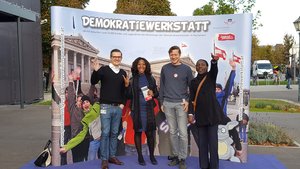
From 22nd to 27th October 2017 two members of the PR department of the Zambian National Assembly visited the Austrian Parliament to gain insights into concepts regarding political education and the opening of the parliament for its citizens.
Interview with Kashimbi Limata and Sibonelo Jere
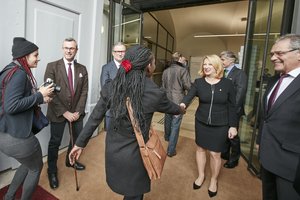
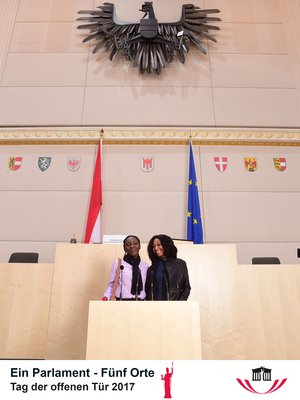
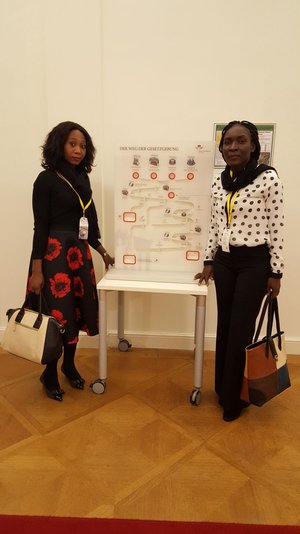
Official statistics show that nearly half of the 16,5 million people in Zambia are under the age of 15. In order to strengthen democracy in Zambia now and in the future, it is a prerequisite to communicate to Zambian youth the importance of democracy, the role of the National Assembly in Zambia's political structure and the need to implement the SDGs in their country. The aim of the working visit was a.o. getting to know the special programs and tools for schoolchildren of the Austrian Parliament, which convey what democracy is and how it works.
Kashimbi Limata and Sibonelo Jere of the PR department at the Zambian Parliament describe their visit.
PNSD: You have visited different facilities of the department for Public Relations and Services for Citizens of the Austrian Parliament – which ideas do you find most useful for your work at the Public Relations Department of the Zambian Parliament?
Limata: The Democracy Workshops showed us how children can be brought to actually participate and discuss the role of parliament and democracy. In it, concept for different age groups were used, each one aiming at making the workshop more interesting and relevant for the children of a certain age and giving them the opportunity to get involved.
Jere: I agree, certainly the Democracy Workshop and the various facets of these workshops are very interesting concepts. But it was also valuable to see the Open Day at the Austrian Parliament, how the InfoPoints are operated and that the Austrian Parliament has its own Gift Shop with many different items to buy, thus helping people to identify themselves with Parliament.
PNSD: The 26th of October is the Austrian National Holiday and traditionally, the Austrian Parliament holds an Open Day for all citizens and visitors. You experienced some of the preparations and the Open Day itself. What was particularly valuable for you and your work?
Jere: We received a lot of information and know-how with regard to the manner in which the Open Day is organized, including details on the number of staff that are involved in organizing it. Also, I found it very interesting to get to know the statistics of visitors who have been to the Open Day in previous years. This, to me, is a reflection of how much interest citizens have in matters of democracy and the institution or parliament.
Limata: I found it very transparent, how the Austrian Parliament is raising awareness among the Austrian people in terms of the fact that the Parliament building is under renovation, why this is necessary and how much it will cost. At the Open Day itself, children were motivated to participate with games and rallies, all of which makes the visit more exciting for them.
PNSD: Major aspects of your training were educational programs for school youth and the guided tours. Which elements presented in the Austrian Parliament can be relevant for the revision of the present educational programs in the Zambian Parliament?
Limata: I would say that, for example, we can also introduce a Democracy Workshop for children and youth, not on a permanent scale, but maybe once a year. This could coincide with the international day for democracy. Two weeks can be dedicated to have democracy workshops within the visitors centre at the parliament building. Also the idea of developing games for children is valuable, as such tools are tailor-made for the target group and makes visits to the Parliament more relevant and memorable. It also enhances the level of understanding of complex matters such as law-making. Generally, the tool that is used in the Austrian Parliament to elaborate the law-making process would be interesting to develop also in Zambia. Generally, it would be interesting to develop a similar law-making tool as used in the Austrian Parliament explaining the legislative process in Zambia.
Jere: For the guided tours in the National Assembly of Zambian it would really be useful to add more detail regarding the historical background of the parliament. This could be interesting for the visitors. If we had Democracy Workshops, as suggested by my colleague, the visitors could also gain more information and knowledge about democracy as such and also how they can participate. Such information is difficult to present in a guided tour. As for the Open Day, a great advantage of such an event would be to allow high numbers of people to access parliament and gain interests in parliamentary processes.

